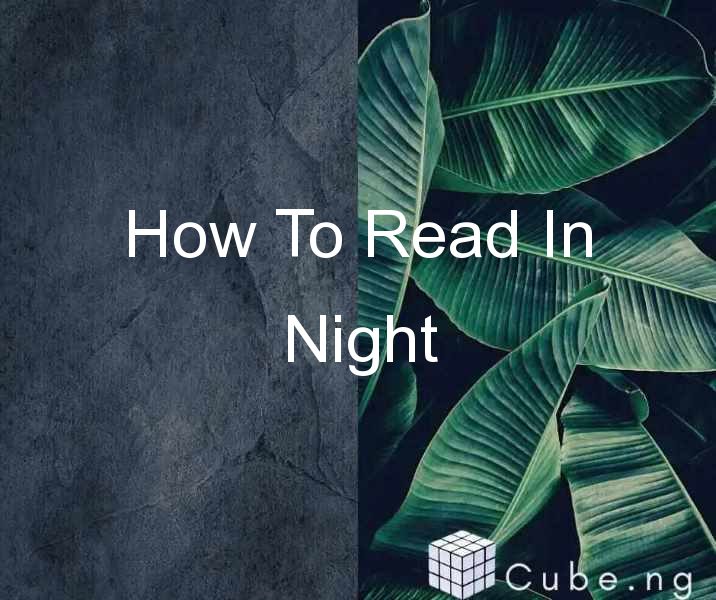Table of Contents
How to Read in Night: Tips and Tricks for Better Nighttime Reading
Reading at night can be a challenging task, especially for those who have trouble sleeping. However, it doesn't have to be a daunting task. With the right techniques and strategies, you can enjoy your favorite book while also getting a good night's rest. In this article, we'll share some tips and tricks for how to read at night.
Why Reading at Night is Difficult
Reading at night is difficult for several reasons. One of the primary reasons is that the body's natural circadian rhythm is disrupted when exposed to artificial light. This can make it difficult to fall asleep and stay asleep. Additionally, the blue light emitted by electronic devices can suppress the production of melatonin, a hormone that regulates sleep.
Another reason why reading at night can be difficult is that our eyes are more sensitive to light in low-light environments. This can cause eye strain, fatigue, and headaches, making it challenging to read for an extended period.
Tips for Reading at Night
- Choose the Right Lighting
Choosing the right lighting is crucial when reading at night. Avoid using bright overhead lights or lamps with high wattage bulbs, as this can make it difficult to relax and fall asleep. Instead, opt for dimmer lights or reading lamps with soft light that won't strain your eyes.
- Use Blue Light Filters
Using blue light filters can help reduce the amount of blue light emitted by electronic devices. Many devices now come with built-in blue light filters that can be activated at night. You can also download apps that can adjust the color temperature of your screen to reduce blue light exposure.
- Take Breaks
Taking regular breaks can help reduce eye strain and fatigue. For every 20 minutes of reading, take a 20-second break and look away from the book or screen. This can help reduce eye strain and prevent headaches.
- Read a Physical Book
Reading a physical book can be easier on the eyes than reading on a screen. Additionally, it can help reduce your exposure to blue light. If you prefer reading on a screen, consider using an e-reader that uses e-ink technology, as this can be easier on the eyes.
- Create a Relaxing Environment
Creating a relaxing environment can help you get in the right mindset for reading at night. Consider dimming the lights, lighting candles, or using essential oils to create a calming atmosphere. Additionally, make sure your bedroom is cool and quiet to promote better sleep.
- Avoid Stimulants
Avoid consuming stimulants such as caffeine or nicotine before bedtime, as this can make it harder to fall asleep. Additionally, avoid engaging in stimulating activities such as playing video games or using social media before bedtime.
- Set a Reading Schedule
Setting a regular reading schedule can help train your body to relax and wind down at night. Consider setting aside a specific time each night for reading, and stick to it as much as possible.
Conclusion
Reading at night can be a relaxing and enjoyable activity. However, it's essential to take steps to promote better sleep and reduce eye strain. By following these tips and tricks, you can enjoy your favorite book while also getting a good night's rest.
FAQs
- Is it better to read a physical book or an e-book at night?
Reading a physical book can be easier on the eyes than reading on a screen. Additionally, it can help reduce your exposure to blue light. If you prefer reading on a screen, consider using an e-reader that uses e-ink technology, as this can be easier on the eyes.
- How can I reduce eye strain when reading at night?
Taking regular breaks, using proper lighting, and reducing exposure to blue light can help reduce eye strain when reading at night.
- Can reading before bed help me fall asleep faster?
Yes, reading before bed can help you relax and wind down, making it easier to fall asleep. However, it's essential to avoid stimulating activities such as playing video games or using social media before bedtime.
- Can drinking caffeine before bed affect my ability to read at night?
Yes, consuming stimulants such as caffeine before bedtime can make it harder to fall asleep and affect your ability to read at night.
- How can I create a relaxing environment for reading at night?
Dimming the lights, lighting candles, or using essential oils can help create a relaxing environment for reading at night. Additionally, make sure your bedroom is cool and quiet to promote better sleep.




